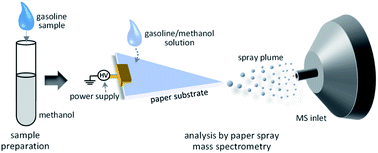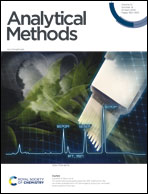Paper spray mass spectrometry for discriminating the quality of commercial gasolines†
Abstract
Paper spray ionization mass spectrometry (PSI-MS) is a powerful technique for the direct analysis of complex samples with high performance but with highly simplified procedures. Herein PSI-MS has been optimized for the discrimination of commercial gasoline quality. For the purpose of increasing the ionization efficiency of gasoline samples, various solvents (e.g., methanol, ethanol, acetonitrile and isopropanol) were mixed with gasoline prior to PSI-MS analysis. The results demonstrated that a high polarity of applied solvent would lead to more information of gasoline samples in generated mass spectra, and 70% (v/v) of gasoline in gasoline/methanol admixtures gave the optimal condition. The optimized PSI-MS was then applied to discriminate commercial gasoline samples from different gas stations of four refining companies. It was found that there was much difference in the gasoline samples from different companies, and even for those from the same refining company but from different gas stations. Further studies of the fingerprinting of gasoline samples indicated that the components of gasoline samples from different gas stations but from one refining company varied significantly, suggesting that no comparable standards were implemented in the refining process of gasolines. Also, PSI-MS was applied to discriminate gasoline adulterated with diesel, and as low as 1% of diesel in gasoline could be detected. These results illustrate that PSI-MS is an alternative and sensitive methodology for rapid evaluation of gasoline quality.



 Please wait while we load your content...
Please wait while we load your content...